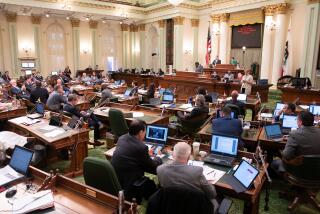Hatch Act Revision Passed Over Warnings of a Veto
- Share via
WASHINGTON — The House, ignoring the Bush Administration’s most recent veto threat, Tuesday gave final congressional approval to legislation that would lift a 50-year-old prohibition against federal employees engaging in partisan political activity in their off-duty hours.
The representatives voted 334 to 87, 52 votes more than the two-thirds majority required to override a veto, for a Senate-passed revision of the Hatch Act and sent it to the President over fresh objections from Atty. Gen. Dick Thornburgh.
Sponsors of the change said it would mean “political emancipation for 3 million federal workers.” Opponents said it would “politicize” the civil service and undermine public confidence in the U.S. government’s integrity.
The vote in the Senate was 67 to 30.
The Hatch Act, enacted in 1939, was designed to insulate federal employees and postal workers from political pressures. Advocates of the change, however, said that about 80% of federal workers today are protected by civil service rules.
“It’s not a big deal to give them a right to participate in the political process if they want,” said Rep. Gerry Sikorski (D-Minn.). He said federal workers have a stake in the political process because of recent cuts in their benefits and pensions.
“We are going to . . . allow federal employees, on their own time, just like their neighbors, to exercise the basic, fundamental rights of political participation that the rest of us enjoy,” Rep. William D. Ford (D-Mich.), floor manager for the bill, said.
Thornburgh protested that the measure would permit “virtually unbridled partisan activities by federal employees, which--history shows--would in turn inevitably lead to the politicization of public administration.”
The attorney general argued that the legislation would, for example, permit district managers of the Internal Revenue Service to serve as officers of political parties after working hours and allow loan officers of the federal housing agency to organize partisan campaigns in their off-duty time.
“We believe, on the basis of experience, that most federal employees . . . simply have no desire to politicize their lives and their jobs by engaging in partisan activity,” he said.
“It is, we think, significant that there has been no groundswell of popular support for this bill from the ranks of federal civil servants,” Thornburgh added in a letter to Rep. Newt Gingrich (R-Ga.), the House minority whip.
Rep. Dick Armey (R-Tex.), who led the opposition to the bill on the House floor, said the change would help the Democratic Party more than the GOP. The bill allows federal workers to make political donations only to a labor organization’s political action committee, and Armey said that union PACs overwhelmingly favor Democratic candidates in their contributions.
More to Read
Get the L.A. Times Politics newsletter
Deeply reported insights into legislation, politics and policy from Sacramento, Washington and beyond. In your inbox twice per week.
You may occasionally receive promotional content from the Los Angeles Times.










